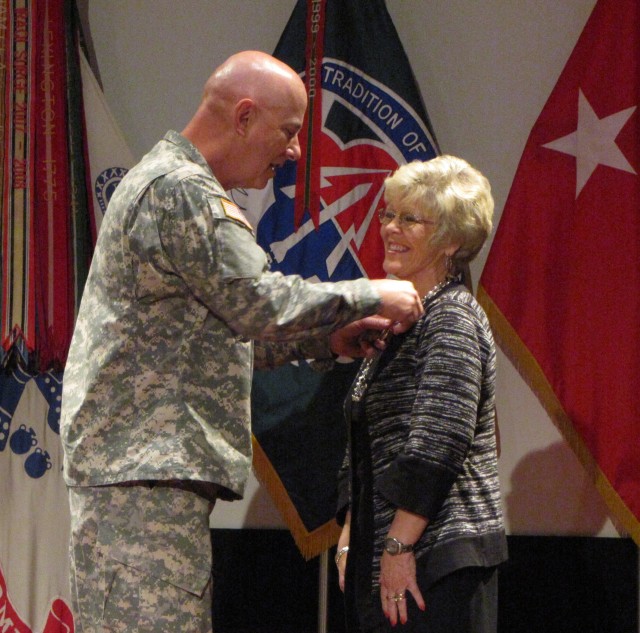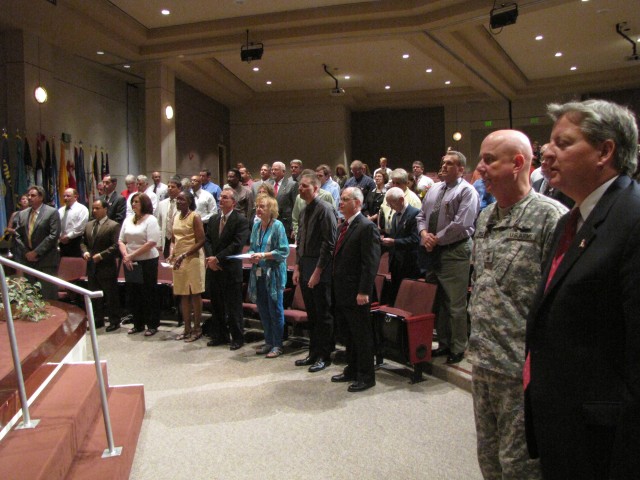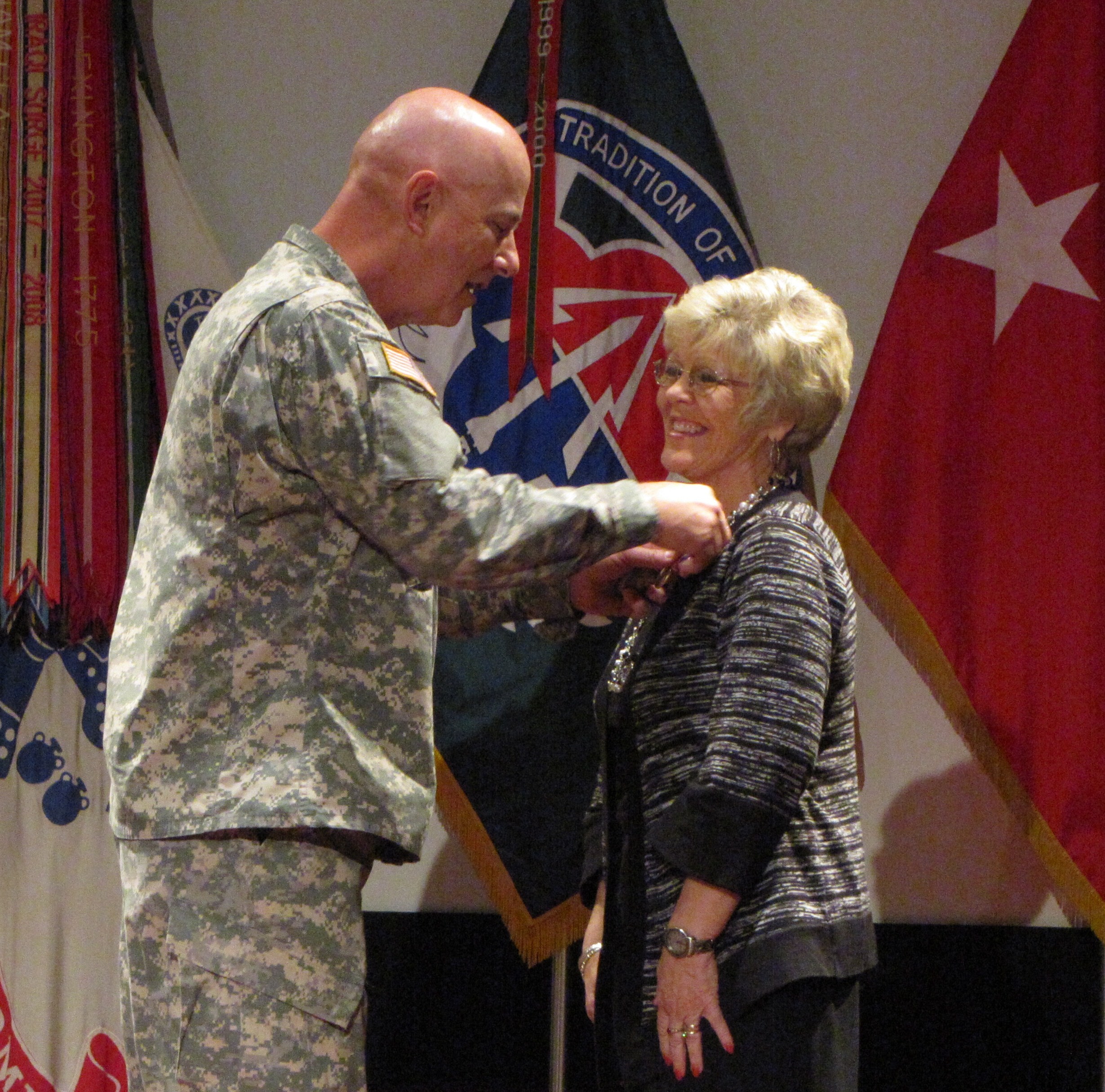REDSTONE ARSENAL, Ala. -- Please accept this on behalf of a grateful command."
"Please thank your family."
"Thank you for what you have done."
Those were the words of appreciation expressed over and over again by Maj. Gen. Jim Myles, commander of the Aviation and Missile Command and Redstone Arsenal, to more than 50 civilian and contractor employees Thursday during an AMCOM Deployed Workforce Recognition Ceremony.
The event, held in Bob Jones Auditorium, recognized the dedication of Team Redstone employees who have voluntarily deployed in support of Soldiers serving in Operation Iraqi Freedom, Operation Enduring Freedom or other parts of the world. It was the fifth Deployed Workforce Recognition Ceremony hosted by AMCOM.
"This is a great day to be able to recognize some great Americans that have gone forth," Myles said. "This is a good news story that recognizes some of our real heroes. This makes me proud of what goes on at Team Redstone."
Many of the recognized employees have volunteered for more than one deployment. They were given certificates of appreciation and many received the Secretary of Defense Medal for the Global War on Terrorism, which is a Department of Defense civilian award.
Every employee honored at the ceremony has a unique story to tell about their deployment and their "own personal calling that you have to go in harm's way to take care of Soldiers," Myles said. "Every one of your families has a personal story."
Such as Tony Williams, who has deployed five times since 2004 as an employee for the Integrated Materiel Management Center's readiness program. He has served six-month deployments in Bagram and Braham, Afghanistan; Baghdad and Al Taqaddum, Iraq; and Kosovo, and a one-year deployment to Korea, to support Soldiers using missile and robotic systems.
By deploying in support of Soldiers, Williams said he is helping to keep terrorism and the war away from U.S. borders.
"I prefer to help Soldiers to help us," he said. "I want them to fight terrorism over there, not here. If they succeed, we succeed here."
Williams served in the Army for 20 years before becoming a DoD civilian in 1999. His wife and four children are used to the long separations.
"They understand. We've always moved and I've always been going into the field," Williams said. "They know I want to help Soldiers. I will deploy again next year, probably to Iraq."
Williams' wife, Dorothy, attended the ceremony.
"As a wife, you worry and pray he will come back safely," she said. "I know he loves what he's doing and I wouldn't want to interfere with that."
Gail McElrath, who served in Iraq for 21 months straight from August 2008 to May of this year, has her own unique story. Despite having a family at home, every time her six-month deployment was coming to an end, she volunteered to extend it.
"I liked it. I liked my job. I just loved it," said McElrath, who worked in administration and the mail room for the 402nd in Balad.
"I did mail for 21 months. Everyone was wonderful. We had such a good rapport with the Soldiers. They appreciated everything we did for them. The Soldiers took good care of us and they protected us."
The deployment involved working 12-hour days, seven days a week.
"You really get close to your co-workers in an environment like that. I miss the camaraderie we shared," she said.
McElrath encouraged other employees to consider volunteering to deploy, although they must be prepared for the risk that comes with working and living in a war zone.
"They shot at us a lot over there. But they weren't good shots," she said, half jokingly.
"It was kind of scary at times. But you get used to it. They did nearly hit our new laundry. A mortar landed about 20 feet away from it. It had only been open a month when that happened."
McElrath came home twice, each time for two weeks, to see her husband, five children and eight grandchildren, all who live in Tennessee. She talked to her husband every day during her deployment, and she enjoyed such perks as flying in a Black Hawk and driving an MRAP (Mine Resistant Ambush Protected) vehicle. Her family also benefited from the extra pay she received.
"It really helped us out and it helped out our kids financially. It was a time when they needed help," she said.
And the deployment taught McElrath about her own abilities.
"You definitely find out how strong you are, and what you can take and what you can't," she said.
A few employees recognized were represented by their families, such as Wiley Foutch, who is currently deployed. In his place were his wife, Angie, who works in the Sparkman Management Office; his son, Michael, a Redstone Arsenal summer hire; and his mom and dad, Dorothy and Wiley Foutch. With Myles retiring this fall, this deployment ceremony is the last opportunity for Foutch to be recognized by the general. And his family made sure he was a part of it, although in an indirect way.
"He's in Balad, Iraq, on his second deployment with the 402nd Reset. They are a fly-away team closing down bases," Angie Foutch said.
"This is very important to our family because we also have two sons in the military and a son-in-law in the military. One of them is in Afghanistan right now and another is getting ready to deploy. My husband volunteered because he wanted to support the Soldiers."
Families, as well as the deployed DoD civilians, pay the price of the long separations caused by deployments.
"You've sacrificed. Your families have sacrificed, too, as well," Myles said. "And why' Because it's the right thing to do, and that makes you special."
From technical expertise to office manpower, AMCOM employees "provide the support needed to continue the mission," he said.
Some of those employees recognized are actually planning another deployment. James Williams will leave again in December for Balad, Iraq, to work as a liaison engineer for the Aviation and Missile Research Development and Engineering Center. Lynn Roberts, who works in Acquisition, will leave in about three weeks for a deployment to Afghanistan.
"I found a need. They need me and I'm going to go," Roberts said.
"Thank you for what you've done and what you're going to do," Myles told her.
Although civilians aren't in the heat of the battle, many risk their lives to work in a war zone. Marlon Turner's deployment took him to "IED Alley" near the anti-American stronghold known as Sadr City.
"You were involved in some pretty bad stuff there. So thank you for your support," Myles said.
Those recognized at the ceremony expressed their own appreciation to Myles for his personal interest in their sacrifice. With every employee, Myles took the time to talk with them about their deployment and then shared that information with the audience.
"It was heartfelt," said five-time deployed Williams. "I wasn't expecting something like this. This recognition shows that what we are doing is really appreciated."
Employees recognized at the Deployed Workforce Recognition Ceremony included the following, listed by organization and place of deployment:
AED Mission Equipment Division-Garrison: Kenneth Arakaki Jr., Garry Mercaldi and James Wilkins,
Balad, Iraq; Kevin Cahill, Kevin Kee, William Lewis, Scott Mitchell and Norman Revelle, Afghanistan; Michael Foley, Phillip Herndon and David Merta, Iraq.
AED (CCAD): Wesley Cass and Vincent Lin, Afghanistan; Steve Noll and Kevin Rees, Kuwait; and James Shamess, Kuwait, Iraq and Afghanistan.
AMCOM: Lynn Roberts, Balad, Iraq; and Peter Machado, Joint Base Balad, Iraq.
AMRDEC: Michael H. Smith, Baghdad and Mosul, Iraq.
AMSAM-MRE-SA: Perry Fulmerhouse, Bagram, Afghanistan.
CCWS: Randy Johnson, George Malone, Bernard Reidinger, Harold Rivas, Richard Thomas, Timmy Underwood and Troy Wilkin, Iraq.
CH-47 Sustainment Directorate: Linda Wolfe, Baghdad, Iraq.
Civilian Personnel Advisory Center: Ella Rodgers, Camp Afrijan, Kuwait.
C-RAM: Thomas Bourque, Timothy McClellan and Diane Stewart, Baghdad, Iraq; Roger Groves, Baghdad and Balad, Iraq; Walter Nettles, Bagram, Afghanistan; Keith Nichols and Ricky Peck, Afghanistan.
G-8: Gail McElrath, Balad, Iraq.
Garrison-Ammunition Surveillance: Wayne Tadlock, Iraq.
Integrated Materiel Management Center: Anthony Cope, Bagram, Afghanistan; Janet Gentry and Daniel Norton, Balad, Iraq; Marlon Turner, Qwest and Balad, Iraq; Paul Varian and George Jurgens, Iraq; Tony Williams, Bagram and Braham, Afghanistan, and Baghdad and Al Taqaddum, Iraq, and Korea.
Joint Contracting Command: Geraldine Paul, Bagram, Afghanistan.
LOGSA: Wayne Stoops, Camp Arifjan, Kuwait.
Program Executive Office for Aviation: Oswald Ingraham, Roy Longino Jr. and Gary Lunsford, Balad, Iraq; Kirk McCollum, Taji, Iraq; Mickey Mittag, Camp Liberty, Iraq; Matthew Reid and Todd Schoenrock, Iraq; James French, Bagram, Afghanistan.
Program Executive Office for Missiles and Space: William Benjamin Hicks Jr., Balad and Baghdad, Iraq.
PM AME: Jeffery Coffman, Afghanistan.
PM-UAS: Richard Trudeau, Taji, Iraq.
Program Director of Aircraft Survivability Equipment: Lisa Johnson, Balad, Iraq.
Security Assistance Management Directorate: Maria Fore, Joint Base Balad, Iraq; Wiley Foutch and Dennis Mitchell, Iraq, and Janice Robinson, Baghdad, Iraq.
SAMD/IMMC: Maria Taylor, Afghanistan.
USATA: Kevin Beverly, Gerald Roberson and Richard Teske, Kuwait.
Utility Helicopter Project Office: Gary Benjamin, Bagram Airbase, Afghanistan.






Social Sharing